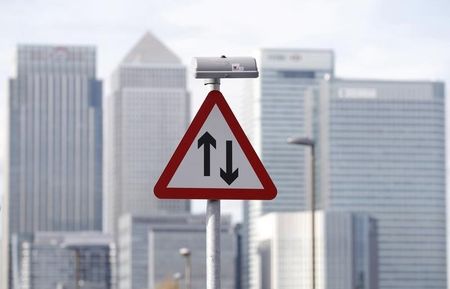By Karin Strohecker
LONDON (Reuters) - British investment managers grew more cautious in October, cutting equity allocations and boosting their cash to its highest level in more than two years as they fretted about risks to the global economic recovery.
A monthly survey of 10 UK-based asset managers found the average cash holding in balanced portfolios almost doubled to 11.2 percent from 6.6 percent, reaching its highest in at least 2 1/2 years. Property investments rose to a high of 4.7 percent.
The gains came at the expense of equity holdings, which dropped to 51.8 percent - the lowest since November 2012. Bond holdings shaved off half a percentage point to 22.2 percent and 'alternative' assets - including hedge funds, private equity and commodities - fell to 10.1 percent from 11.0 percent.
"We are currently suffering from a period of risk aversion with volatility levels spiralling upwards as investors become nervous about the strength of the overall global economy," said Peter Lowman, chief investment officer at Investment Quorum.
"Concerns over the euro zone, and the recent Mexican standoff between the ECB and Bundesbank over further policy directives surrounding monetary policies, have weighed heavily on market sentiment," he said. A clouded outlook for China's economy also put pressure on markets, he said.
In debt markets, British investors increased their U.S./Canada exposure to 37 percent from 24.1 percent and ramped up euro zone holdings to 26.0 percent from 20.4 percent. They cut their holdings of UK debt to 29.6 percent from 42.1 percent.
The poll was conducted between Oct. 17-28 and before the U.S. Federal Reserve announced the end of its six-year long bond-buying stimulus programme on Wednesday. While the Fed has signalled it is in no hurry to raise interest rates, data showed this week the U.S. economy expanded a brisk 3.5 percent in the third quarter.
U.S. equities were most favoured, as funds raised U.S./Canada holdings by 0.6 percentage points to 29.5 percent. They upped euro zone allocations by 1.4 percentage points to 15.9 percent, at the expense of both British and Japanese stocks.
Better-than-expected corporate earnings are dispelling some of the global growth concerns. In the U.S., more than 70 percent of S&P 500 companies that have reported earnings have beaten analyst forecasts. In Europe, about 66 percent of companies in the STOXX Europe 600 (STOXX) benchmark beat forecasts.
A U.S. rate hike next year would signal confidence in the economic recovery in the United States and worldwide, said Standard Life. The greatest risk to investors would be the Fed's finding itself unable to do so.
"If (the Fed) is unable to raise rates, say that the timing has been pushed back to 2016, then there will be much more discussion about the possibility of secular stagnation, and concerns that the weakness in China, Europe and Japan is becoming too great a burden for policy makers to handle," Standard Life said.

(Reporting By Karin Strohecker; Editing by Larry King)
